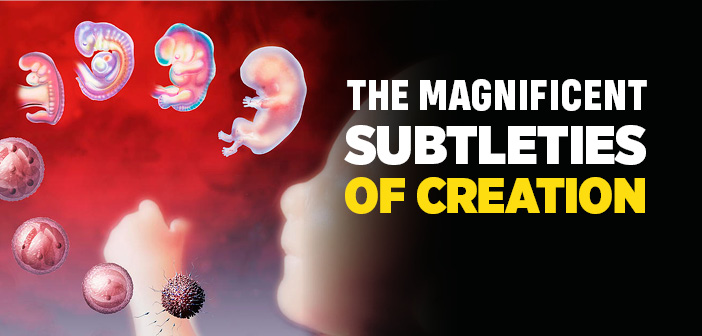Recent discoveries in genetics show that each person carries another kind of code exclusive to himself. What’s more, so tiny are these genes that even the entire genes of every single living being on Earth would not be able to fill up something as small as a tailor’s thimble.
Invisible even through a microscope, these genes settle in the cells of every living organism and give them their characteristics. In this sense, a thimble might seem too small to be able to hold each individual characteristic of the over 6 billion human beings there are in the world today; yet the evidence in support leaves no room for doubt.
How does, then, this tiny thing called the gene keep hold of the characteristics of every single living organism of who knows what amount? How is it that it can safeguard in an infinitesimally small area every single attribute of a given organism, even all the way to her psychological characteristics?
The fact that millions of atoms trapped in a single gene, too small to see even with the aid of a microscope, can virtually govern life on Earth, can only be through the discretion of a boundlessly Wise Creator. Here, there is not the slightest room for theory.[1]
Drawing attention to this, the Almighty declares:
“And when your Lord brought forth from the children of Adam, from their backs, their descendants, and made them bear witness against their own souls: Am I not your Lord? They said: Yes! we bear witness. Lest you should say on the day of resurrection: Surely we were heedless of this.” (al-Araf, 172)
These and alike manifestations of Divine power and art, which have been discovered only recently, leave reason speechless. Inspired by such feelings was Ziya Pasha, who as early as the 19th century, wrote:
I glorify He whose art makes minds meek,
And whose might leaves the wise weak…
Who operates the Factory that is the Human Body?
Man must appreciate the fact that all beings, in the skies and on earth and in the sea, including him, depend on the Almighty every moment. On the simplest level, he must see:
Nearly all the activities within our bodies take place independently of our will. In this manner do our heartbeats, our breathing, the actions of all our other organs take place, including the inner workings within our cells and the mutual aid and communication that run frenetically between them. Who knows of the amount of malfunctions we would have caused if only the activities of one of these perfectly functioning organs or even the hundreds of types of biochemical reactions that occur within a single cell were left to our administering and control for only a day?[2]
How enormous a lesson there is in the fact that, on the one hand, we see a 10 ton elephant succumb to the command of a 10 year old child while on the other, as an expression of the sheer weakness of man, a tiny virus, invisible to the naked eye, bring down many an imposing man of strength!
We therefore must never ascribe to ourselves the strength given to us by the Almighty; we must never give way to arrogance and must always be reminding ourselves of the True Owner of strength. We must retreat to a constant state of gratitude, acknowledging that we are not even specks of dust next to the Divine Power. We must always seek refuge in the Almighty.
Here, we have only briefly touched upon some of the many instances of Divine power and wisdom so abundantly manifested in human beings. Sparing time to reflect on man is bound to expose many more mysteries and wisdom Allah, glory unto Him, has placed therein. If a book was to be written for each cell of the human body, it would surely be an appropriate undertaking.
[1] See, İlim-Ahlâk-Îman, prepared by: M. Rahmi Balaban, p. 189-190.
[2] See, Şâkir Kocabaş, Kur’ân’da Yaratılış, p. 115.
Source: Osman Nuri Topbaş, Contemplation in Islam, Erkam Public.




